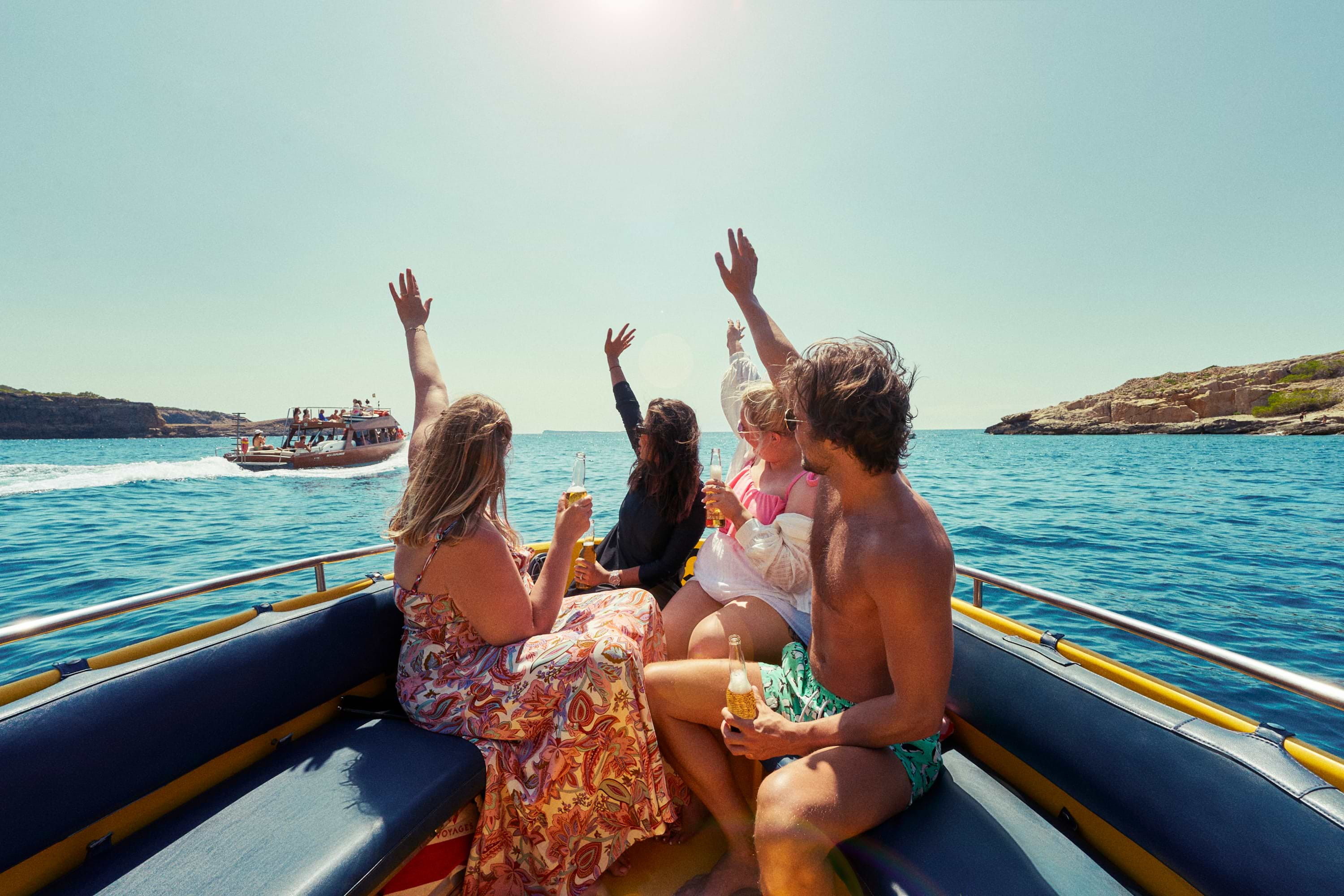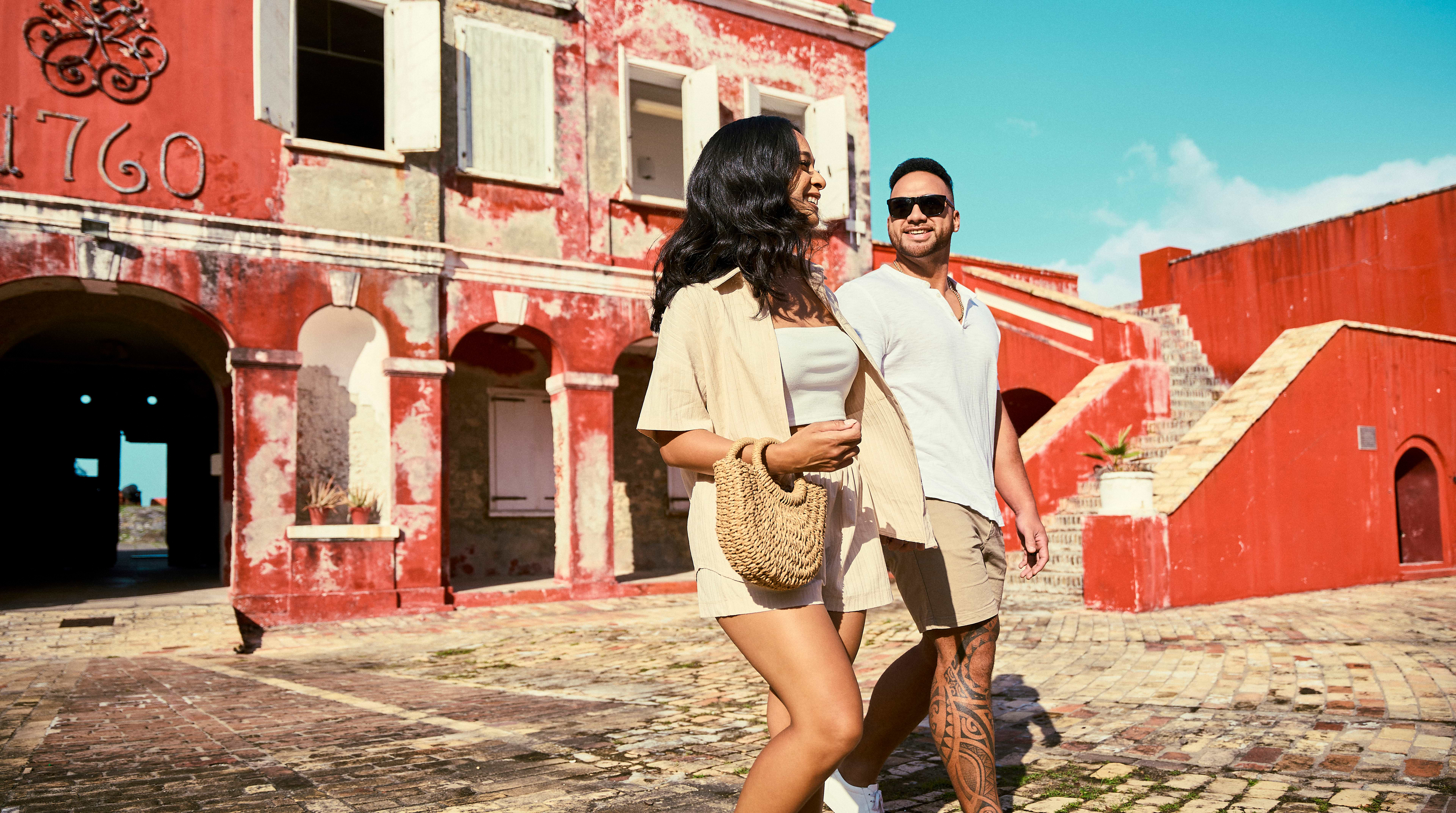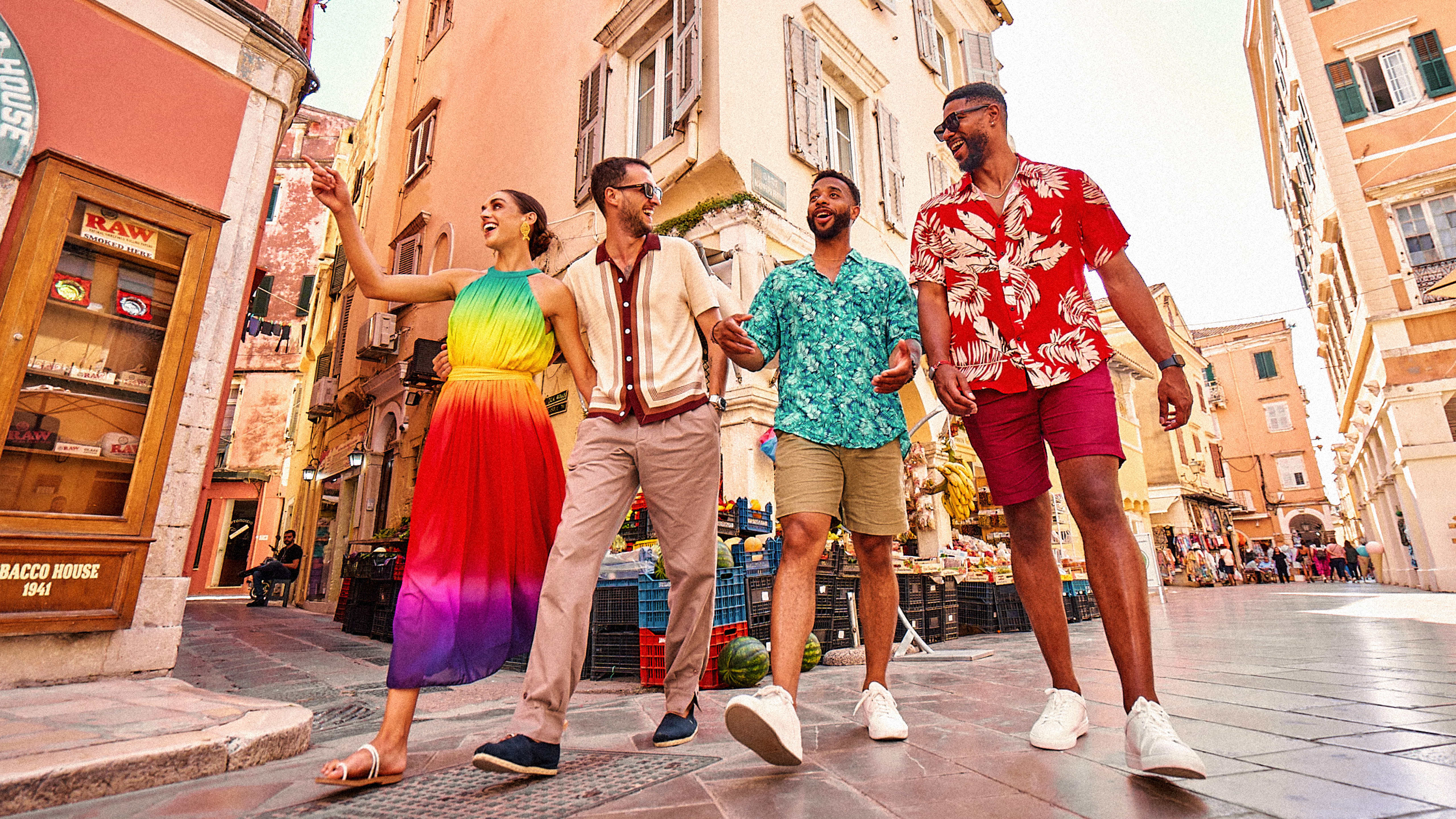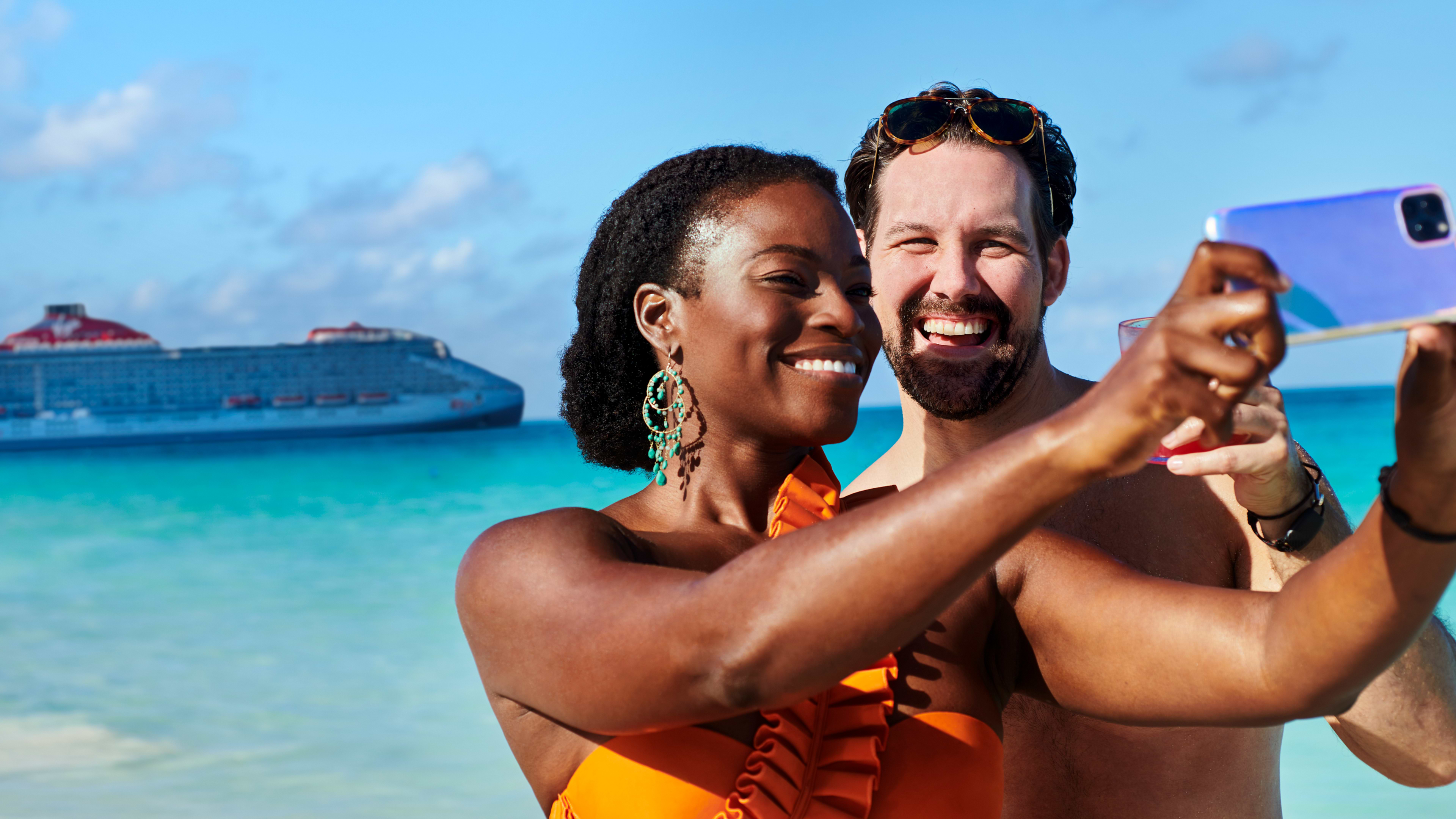
Unless you actually paid attention in high school, you probably fit into one of two travel categories: the person who doesn’t even attempt to speak the local language, or the person who tries and fails miserably. Either way, it’s not a great feeling. Not speaking the language can make you feel even more lost, more alone, than you already do when traveling. Well, there’s a remedy for that: learning a language while traveling. Or ya know, the basic terms that help you get around.
Learn Basic Foreign Terms Before You Travel
Ironically, would-be travelers showed a ton of interest in foreign language learning during COVID-19 lockdowns, when international travel was impossible. People hunkered down, fired up Duolingo, butchered foreign word pronunciations in the privacy of their own homes, and dreamed of the day they’d emerge from lockdown fluent in French. That 165-day Duolingo streak might have faded into memory by the time borders actually opened, but they had the right idea: learning a language while traveling is the perfect tool for truly immersing yourself in another culture.
And while it may sound like a tall order, remember — no one expects you to be completely fluent. When you decide to learn a language for a trip, that doesn’t mean memorizing that country’s entire lexicon. Familiarize yourself with the basics in advance, and bring along a phrase book with the crucial phrases to learn in a new language. You won’t be a master linguist, but you’ll (hopefully) be able to order off a menu, ask for directions, or at the very least, say “hello” to your hotel concierge. We’re no Duolingo, but we want to do our part to prepare you for some of our international voyages.
Spain (and other Spanish speaking countries!), Hola
A trip to a Spanish-speaking country can take many forms. You might be indulging in paella in Barcelona, partying until 6am in Ibiza, kicking back at a resort, hiking through a jungle, or simply basking in the island sun. Our cruises cover all the bases, sailing to the Spanish ports of Barcelona, Palma de Mallorca, Málaga, and Ibiza, and Caribbean ports in Mexico, Puerto Rico, the Dominican Republic, and beyond. But no matter where you’re going, it helps to know some basic Spanish.
- “Hola” (Hello) - A tried and true classic. Go a full day without saying hello. You can’t. Well, maybe you can, but you wouldn’t make many friends.
- “Gracias” (Thank You) - Another easy one. Even though you don’t speak a lick of Spanish, chances are you’ve said “gracias” countless times in your life. Pat yourself on the back. You’re already not-rude in Spanish.
- “Cuidate” (Take Care) - So you’ve mastered “adios” and want to take your goodbyes to the next level? Enter “cuidate.” Get the hang of this one, and you’re not just an American grasping at Spanish language straws – you’re an American clutching one very easy, very useful, Spanish language straw for dear life.
- “Donde esta la mejor Paloma de la ciudad?” (Where’s the best Paloma in town?) - Enough hellos, goodbyes, and pleasantries. Now for the really important stuff. Palomas are a tropical tequila cocktail popular throughout Mexico and the Caribbean, and you need to know where to find one. There’s no time to waste. Certainly no time to pull out your phrase book. If you memorize nothing else in Spanish, memorize this one.
Greece (Yassou means hello)
With the new launch of the new Resilient Lady ship, sailing out of Athens, Virgin Voyages is officially making a splash in the Aegean. Our Greece itineraries hit bucket list destinations like Santorini, Mykonos, Rhodes, Corfu, and more — but if you tackle the Greek islands unprepared, you’ll feel as blind as Polyphemus the cyclops. Here are some vocab words to get you ready for your own Greek odyssey.
- “Yassou” (Hello OR Goodbye) - It’s a BOGO. A two-for-one special. The best value in the Aegean. Learn one word, get two meanings. What more could you ask for?
- “Efcharisto” (Thank You) - It’s nice to be nice. And let’s face it, “efcharisto” sounds a lot cooler than “thank you” anyway.
- “Seeghnomee” (Excuse me) - Let’s face it - you’re going to get lost at some point. There’s nothing wrong with that. Getting lost is part of travel. But if you don’t get yourself un-lost, it’s not an adventure, it’s the plot of a really bad movie. So don’t be afraid to say, “seeghnomee, kýrie, poú eínai to krouazieróploió mou? (excuse me, sir, where on earth is my cruise ship?)”
- “Souvlaki" (Souvlaki) - An easy one to say, and even easier to eat. Souvlaki is a Greek dish consisting of small pieces of meat or veggies on a skewer. Learn how to say it, ask where to find it, and ask for more of it.
Italy (Ciao means hello)
Honestly, you could have an incredible time in Italy without speaking to a single person. Even your travel companions. Marveling at the colorful cliffside houses, drinking Italian wine, or cycling through the Tuscan countryside, is plenty. But as with every destination, our cruises to La Spezia and Marina di Carrara will be far more enjoyable if you make some friends.
- “Alla prossima” (Until Next Time) - The perfect word for bidding farewell in Italy. Once you go there, it’s tough not to go back. Unlike back home, where “until next time” is simply a figure of speech, in Italy there’s always a next time.
- “Per favore” (Please) - Italians might have fiery personalities, but that doesn’t mean they don’t have manners. Don’t just order that shot of limoncello. Throw in a “per favore,” and you might even get a little extra.
- “Saluti” (Cheers!) - Whether you’re clinking cups of dangerously strong espresso or glasses of negroni, you’ll be saying “cheers!” more than “hello” in Italy.
- “Dov'è il miglior gelato?” (Where is the best gelato?) - Travelers are often plagued by choices, but few choices are more difficult than where to eat gelato in Italy. Gelato stands are as plentiful as pigeons in the ancient piazzas. They all kinda look the same. How do you find the best one? “Dov'è il miglior gelato?”
France (Bonjour means hello)
Sailing the coast of France hearkens back to the Golden Age of Hollywood. Only difference is – in those movies, the Americans never spoke French. You will. And that makes your trip even more special and glamorous. Whether you’re exploring the port of Marseille, rubbing shoulders with the rich and famous in Cannes, or checking out Napoleon’s birthplace of Corsica, these are the French words and phrases you should know.
- “Je suis désolé” (I’m sorry) - Unless you actually speak French, you’ll be using this one a lot. There’s no shame in that. Use it as a cushion to fall back on when you inevitably butcher all the other words on this list.
- “Où est la tour Eiffel?” (Where is the Eiffel Tower) - This one’s here just so you don’t accidentally say it. Being a tourist is totally fine, but announcing your tourist status to passerby isn’t the best way to feel like a local. Don’t ask where the Eiffel Tower is. Just look up. It’s the big iron thing that looks like a pretty cell tower.
- “Au revoir” (Goodbye) - Somehow, in French it doesn’t just sound like it means “goodbye.” It sounds like the last scene of a movie where the woman steps onto an airplane, her dress blowing in the wind, and casts a backward glance at her lover as she leaves him forever. Just make sure you pronounce it right, or it’ll lose the magic.
- “Je ne parle Francais” (I don’t speak French) - If you learn nothing else about the French language, learn this one. A simple “Je ne parle Francais” might not be the most enlightened way to immerse yourself in French culture, but it’s the easiest, and most honest, way to explain your ignorance.
Croatia (Zdravo means hello)
Maybe you’ve picked up a little Spanish in the course of your life. Some French or Italian basics have probably seeped into your English vernacular. We’re betting, though, that you don’t casually drop Croatian words in your everyday conversation. Well, you’re in luck, because with these phrases, you’ll be strutting the streets of Dubrovnik and Split like a local in no time.
- “Dobar dan” (Good day) - Sure, you could go with a simple “Bok” (Hello), but you’re an advanced linguist by now. You can handle a three-syllable greeting. “Dobar Dan” is one of the most common and accurate phrases you’ll hear – it’s always a good day when you’re in Croatia.
- “Kako se zoveš” (What’s your name?) - Good luck making friends without this one. It’s the first step toward meeting your Dubrovnik bar crawl crew, or your future Croatian husband or wife.
- “Hvala” (Thank You) - Whether it’s after being served Plavac Mali wine, Kulen sausage, or just getting directions, a little hvala goes a long way.
- “Gdje je plaža” (Where is the beach?) - If you’re in Croatia, you’re probably hitting the beach. Save yourself the time, leave your phrase book at home, and memorize this one. If there’s one reason to learn a language for a trip, this is it.



